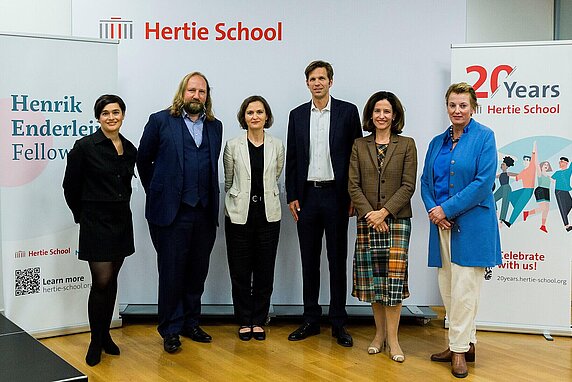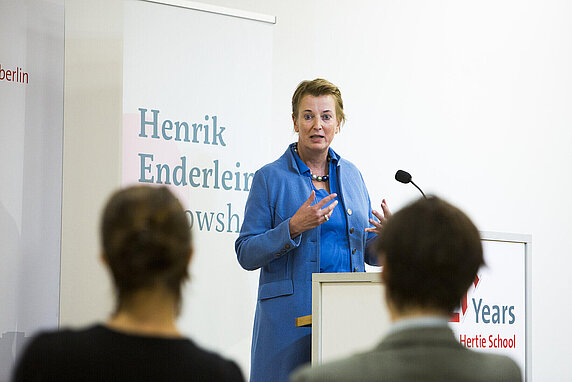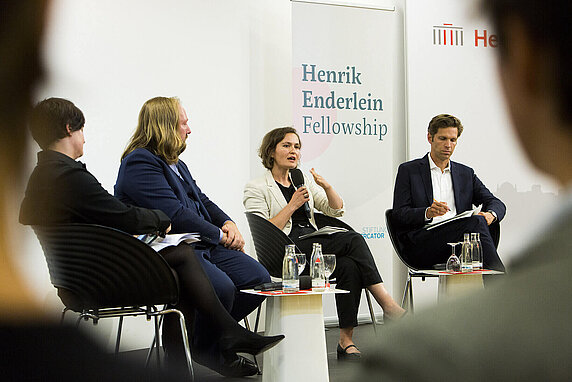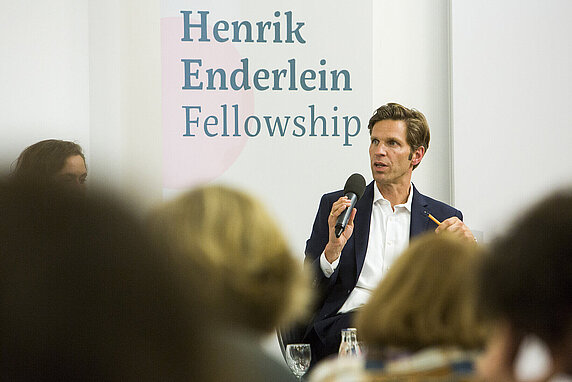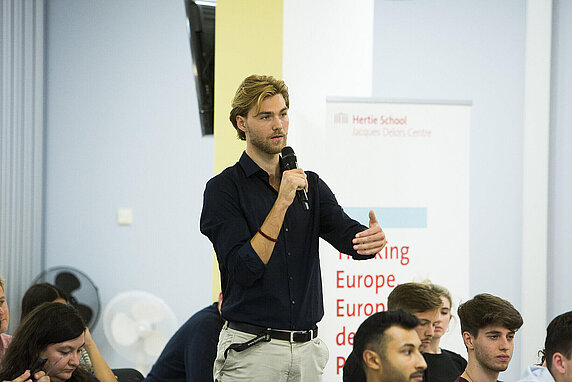Hertie School hosts public lecture by outgoing Henrik Enderlein Fellow Johannes Lindner and presents incoming Fellow Besa Shahini.
At an event on campus on 19 September, the Hertie School and Stiftung Mercator presented the new Henrik Enderlein Fellow Besa Shahini, former Albanian Minister of Education and 2019 Alumni Achievement Award winner. The event included a public lecture by outgoing Fellow and current Jacques Delors Centre Co-Director Johannes Lindner, as well as a panel discussion including Lindner, Shahini and the Chairman of the Committee on European Union Affairs of the German Bundestag, Anton Hofreiter. The discussion was moderated by Le Monde correspondent Cécile Boutelet.
The event was kicked off by welcoming remarks from Hertie School President Cornelia Woll and Member of the Advisory Council of Stiftung Mercator Dr Almut Wieland-Karimi. Both underlined that the Fellowship was an important initiative to commemorate the legacy of former Hertie School President Henrik Enderlein. Woll welcomed back Besa Shahini, who graduated from the Hertie School in 2009 with a Master of Public Policy, and thanked Johannes Lindner for his work as Fellow (noting that he would stay on at the Hertie School in his role as Co-Director). In bidding farewell to Lindner, Wieland-Karimi said that Shahini was a “perfect second Henrik Enderlein Fellow”. “One of the problems we have in the European Union is these silos we are working in,” she noted. “We need people who are bridge builders – Besa is definitely one of them.”
Lindner’s lecture outlines how EU can address current crises
In his lecture, titled “The case for a stronger Europe: what needs to change in a deeper and wider Union?”, Lindner compared the crises that the EU is currently facing with the euro crisis. Drawing on the approach that Henrik Enderlein had developed during and after the euro crisis, he presented three elements:
1. Understand in-built tensions and weaknesses in the EU: Climate change, the pandemic, US-China rivalry and the war in Ukraine have shifted the global order in a way that seriously challenges the current set-up of the European Union. “The EU is called to be an actor on climate, resilience, competitiveness and defence but lacks the institutional capacity and financial means to do so,” he argued. “This creates in-built tensions and weaknesses within the Union that lead to inherent instability.” The goals of the EU, including enlargement, cannot be achieved without a significant upgrade of the EU budget and institutional reform.
2. Develop concrete reform proposals: The current Multiannual Financial Framework (MFF), the seven-year budget plans of the EU, runs until 2027. Lindner argued that debate on the next MFF must start now. Among other things, negotiations will need to focus on allocating parts of national fiscal policies to the EU level to address supranational challenges, such as the green and digital transition and defence, as well as to take on the costs of rebuilding Ukraine and of eventually including new members in the common European agricultural policy and structural and cohesion funds.
3. Build alliances: Lindner argued that Germany plays an important role in shaping the speed and direction of European integration but that “there is an unfortunate ambivalence in Germany about its role in Europe”. Lindner called for a “Europe-Pact” in which Germany addresses the challenges it is facing, including a lack of competitiveness and over-reliance on global trade, with European solutions. In his view, “Germany must assume more responsibility for shaping the future and should develop an overall strategy for modernising the country and Europe and coordinate it closely with the other member states – above all France – and EU institutions”.
Panel discussion focusses on EU enlargement in the Western Balkans
In the panel that followed Lindner’s lecture, the speakers Lindner, Shahini and Hofreiter discussed how EU enlargement should take place in the Western Balkans, which includes North Macedonia, Montenegro, Serbia, Albania, Bosnia and Herzegovina, and Kosovo, as well as vis-à-vis Ukraine, Moldova and potentially Georgia. Lindner argued that the EU must give a clear prospect to these countries, whether that be accession to the Union or close partnership. While he was in favour of enlargement, he stressed that the EU must ensure the rule of law, warning that “we should not compromise on certain values and structures within the Union”.
For Shahini, a credible prospect of membership is crucial because introducing the necessary reforms takes time and is often costly. “The reason why it worked so well with previous enlargement waves was that the process was very clear,” she said. “For the Western Balkans, that wasn’t the case.” She argued that reforms had stalled in the Western Balkans in the last ten years because the countries of the region no longer believed in accession.
Hofreiter also criticised the EU’s dealing with enlargement, noting that France and Germany in particular previously showed no interest in moving the process in the Western Balkans forward. While he agreed with Lindner on the importance of introducing reforms, the need for reform should not allow opponents of enlargement to halt the process.
In moving forward with EU enlargement, Shahini and Hofreiter advocated the possibility of a staged accession process.
Watch a recording of the event.
About the Henrik Enderlein Fellowship
The Henrik Enderlein Fellowship commemorates the Hertie School’s late president and founder of the Jacques Delors Centre Henrik Enderlein. It is awarded annually to outstanding personalities dedicated to a strong European Union and enables regular research stays at the Hertie School for scholars, policymakers and academics. The fellowship contributes to building networks that bring together stakeholders from science, policy and politics in tackling urgent issues on the European and national agenda. The Henrik Enderlein Fellowship is funded by Stiftung Mercator.
More about our experts
-
Johannes Lindner, Co-Director, Jacques Delors Centre
-
Cornelia Woll, President and Professor of International Political Economy

